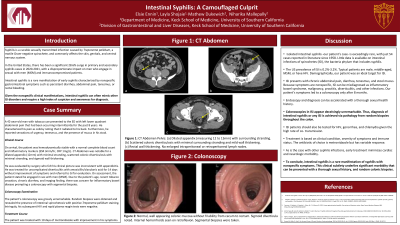Monday Poster Session
Category: Colon
P1635 - Intestinal Syphilis: A Camouflaged Culprit
Monday, October 23, 2023
10:30 AM - 4:15 PM PT
Location: Exhibit Hall

Has Audio

Elsie Ennin, MD
Keck School of Medicine of USC
Los Angeles, CA
Presenting Author(s)
Elsie Ennin, MD1, Layla Shojaie, MD1, Samantha Yasueda, MD1, Mathew Dukewick, MD, PharmD2, Niharika Mallepally, MD, MPH2
1Keck School of Medicine of USC, Los Angeles, CA; 2Keck School of Medicine, University of Southern California, Los Angeles, CA
Introduction: Intestinal syphilis is a rare manifestation of early syphilis which causes vague GI symptoms and significant morbidity.
Case Description/Methods: A 42-year-old man with tobacco use presented with 8 years of intermittent left lower quadrant abdominal pain. His pain was colicky, radiated to his back, and was accompanied by tenesmus and mucus in the stool. On arrival, the patient was hemodynamically stable with a normal complete blood count and inflammatory markers (ESR 3mm/hr, CRP 1mg/L). CT abdomen found diverticulosis, sigmoid wall thickening, and possible colitis. When asked, the patient stated he engaged in sex with men (MSM). A colonoscopy noted grossly unremarkable mucosa but random biopsies later revealed intestinal syphilis. The patient tested negative for other sexually-transmitted infections. He was successfully treated with 10 days of metronidazole.
Discussion: Syphilis is caused by the Treponema pallidum spirochete and has a 52% increase in US cases since 2016. Primary syphilis involves a skin lesion, secondary syphilis has constitutional symptoms and rashes, and late syphilis has neurologic and cardiovascular signs. Isolated intestinal syphilis- our patient’s case- is exceedingly rare, with just 54 cases reported in literature since 1958. Little data is available on intestinal infections of spirochetes (ISI), the bacteria phylum that includes syphilis. The US prevalence of ISI is 0.2%-3.2%. Typical patients are male, middle-aged, MSM, or have HIV. Demographically, our patient was an ideal target for ISI. ISI presents with abdominal pain, diarrhea, tenesmus, and stool mucus. Because symptoms are nonspecific, ISI can be misdiagnosed as proctitis or inflammatory bowel syndrome. Our patient’s symptoms led to a colonoscopy only after 8 months. Endoscopy and diagnosis can be accelerated with a thorough sexual health history. Colonoscopies in ISI appear deceivingly unremarkable. Thus, diagnosis of intestinal syphilis or any ISI is achieved via pathology from random biopsies throughout the colon. ISI patients should also be tested for HIV, gonorrhea, and chlamydia given the high rate of cotransmission. Treatment is metronidazole but has variable response. As is the case with other syphilis infections, early treatment minimizes cardiac and neurologic morbidity. To conclude, intestinal syphilis is a rare manifestation of syphilis with nonspecific symptoms. This clinical subtlety underlies significant morbidity that can be prevented with a thorough sexual history, and random colonic biopsies.

Disclosures:
Elsie Ennin, MD1, Layla Shojaie, MD1, Samantha Yasueda, MD1, Mathew Dukewick, MD, PharmD2, Niharika Mallepally, MD, MPH2. P1635 - Intestinal Syphilis: A Camouflaged Culprit, ACG 2023 Annual Scientific Meeting Abstracts. Vancouver, BC, Canada: American College of Gastroenterology.
1Keck School of Medicine of USC, Los Angeles, CA; 2Keck School of Medicine, University of Southern California, Los Angeles, CA
Introduction: Intestinal syphilis is a rare manifestation of early syphilis which causes vague GI symptoms and significant morbidity.
Case Description/Methods: A 42-year-old man with tobacco use presented with 8 years of intermittent left lower quadrant abdominal pain. His pain was colicky, radiated to his back, and was accompanied by tenesmus and mucus in the stool. On arrival, the patient was hemodynamically stable with a normal complete blood count and inflammatory markers (ESR 3mm/hr, CRP 1mg/L). CT abdomen found diverticulosis, sigmoid wall thickening, and possible colitis. When asked, the patient stated he engaged in sex with men (MSM). A colonoscopy noted grossly unremarkable mucosa but random biopsies later revealed intestinal syphilis. The patient tested negative for other sexually-transmitted infections. He was successfully treated with 10 days of metronidazole.
Discussion: Syphilis is caused by the Treponema pallidum spirochete and has a 52% increase in US cases since 2016. Primary syphilis involves a skin lesion, secondary syphilis has constitutional symptoms and rashes, and late syphilis has neurologic and cardiovascular signs. Isolated intestinal syphilis- our patient’s case- is exceedingly rare, with just 54 cases reported in literature since 1958. Little data is available on intestinal infections of spirochetes (ISI), the bacteria phylum that includes syphilis. The US prevalence of ISI is 0.2%-3.2%. Typical patients are male, middle-aged, MSM, or have HIV. Demographically, our patient was an ideal target for ISI. ISI presents with abdominal pain, diarrhea, tenesmus, and stool mucus. Because symptoms are nonspecific, ISI can be misdiagnosed as proctitis or inflammatory bowel syndrome. Our patient’s symptoms led to a colonoscopy only after 8 months. Endoscopy and diagnosis can be accelerated with a thorough sexual health history. Colonoscopies in ISI appear deceivingly unremarkable. Thus, diagnosis of intestinal syphilis or any ISI is achieved via pathology from random biopsies throughout the colon. ISI patients should also be tested for HIV, gonorrhea, and chlamydia given the high rate of cotransmission. Treatment is metronidazole but has variable response. As is the case with other syphilis infections, early treatment minimizes cardiac and neurologic morbidity. To conclude, intestinal syphilis is a rare manifestation of syphilis with nonspecific symptoms. This clinical subtlety underlies significant morbidity that can be prevented with a thorough sexual history, and random colonic biopsies.

Figure: Figure 1: Normal colonoscopy findings throughout colon and rectum
Disclosures:
Elsie Ennin indicated no relevant financial relationships.
Layla Shojaie indicated no relevant financial relationships.
Samantha Yasueda indicated no relevant financial relationships.
Mathew Dukewick: GSK – Spouse employment.
Niharika Mallepally indicated no relevant financial relationships.
Elsie Ennin, MD1, Layla Shojaie, MD1, Samantha Yasueda, MD1, Mathew Dukewick, MD, PharmD2, Niharika Mallepally, MD, MPH2. P1635 - Intestinal Syphilis: A Camouflaged Culprit, ACG 2023 Annual Scientific Meeting Abstracts. Vancouver, BC, Canada: American College of Gastroenterology.

